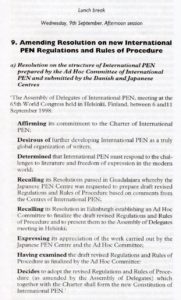Posts Tagged ‘Terry Carlbom’
PEN Journey 24: Moscow—Face Off/Face Down: Blinis and Bombs—Welcome to the 21st Century
PEN International celebrates its Centenary in 2021. I’ve been active in PEN for more than 30 years in various positions and now as an International Vice President Emeritus. With memories stirring and file drawers of documents and correspondence bulging, I am a bit of a walking archive and have been asked by PEN International to write down memories. I hope this personal PEN journey will be of interest.
“Contrary to our tradition, this year’s PEN Congress is being held in a country in which a massive, genocidal military and paramilitary operation is under way. Besides mass murder, the crimes perpetrated against the civil population of Chechnya include deportation, rape, torture, destruction and theft of personal property as well as the systematic looting and destruction of the material bases of Chechnyan culture and civilization. At the same time, freedom of information has been severely curtailed, and the official propaganda plays on xenophobic and even racist ethnic stereotypes…” So began a Declaration from the 67th World Congress of International PEN voted by the Assembly of Delegates in May, 2000.
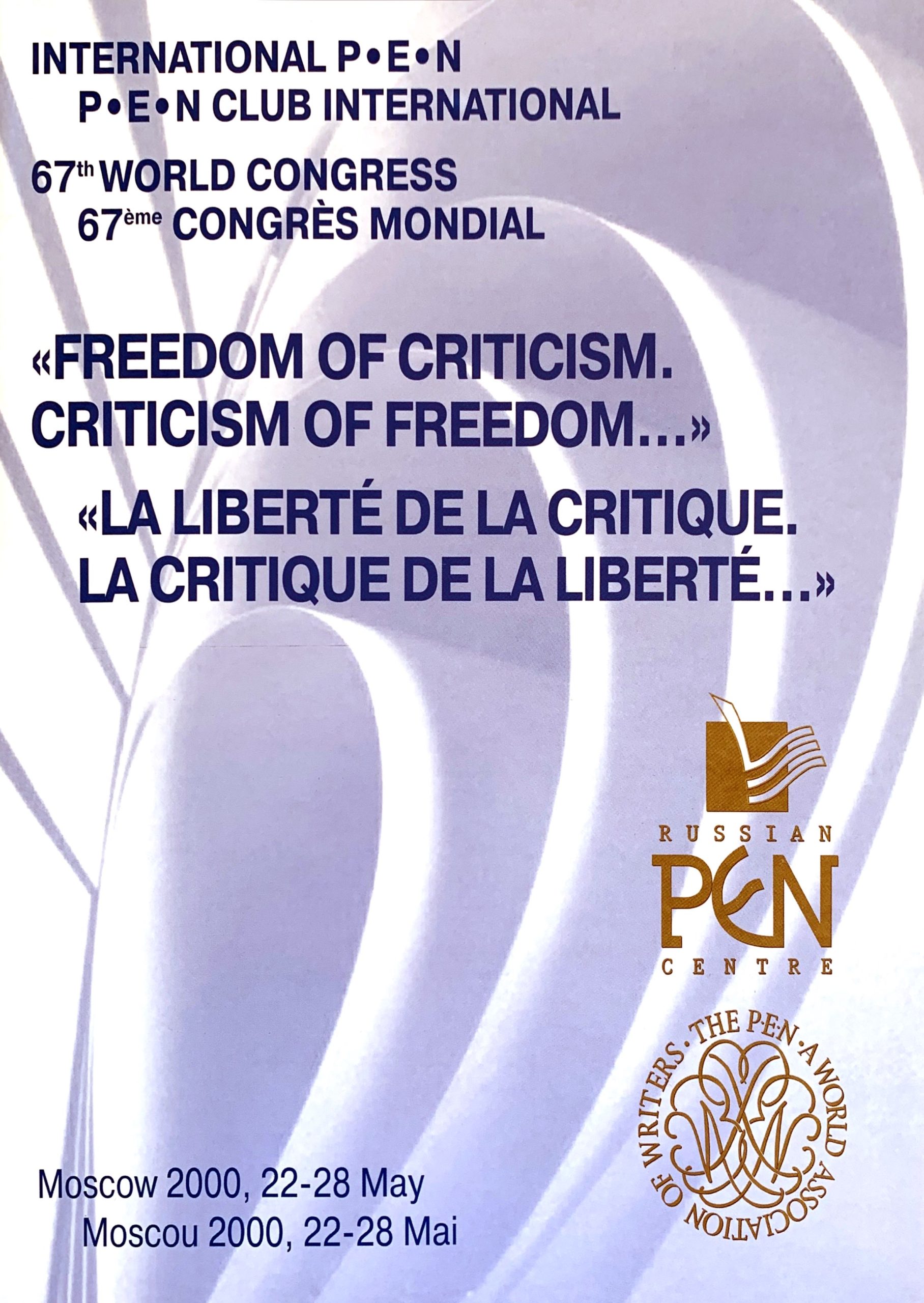
Program for PEN International 67th World Congress, Moscow
The decision to hold the International PEN Congress in Moscow was a controversial one, resulting in some members refusing to attend because of Russia’s prosecution of the war in Chechnya and the concern that holding a Congress in Moscow would give the government an appearance of approval. However, PEN’s Secretariat with the new Executive Committee concluded that the long-planned millennial Congress also presented the opportunity for International PEN to show solidarity with Russian PEN which had been outspoken both on the war and on behalf of Russian journalists and writers under pressure.
“The writers of Russia, united under the auspices of the Russian Centre of the International PEN Club, are concerned about the escalation of the war in Chechnya which is becoming a threat to not only peaceful residents of Grozny-city but also to the national security of Russia. The ultimatum announced to women, children and old people of the Chechen capital makes them hostages of both terrorists and federal forces. It is hard to believe that in this situation the Russian authorities are going to use the same methods as terrorists. We are very aware how hard it is to cut the tight Chechen knot, but in any case innocent people do not have to become victims of the decisions taken…” Russian PEN sent this appeal earlier to the acting President of the Russian Federation, Vladimir Putin.
Russian PEN members, including President Andrei Bitov, had signed the appeal. Russian PEN’s General Secretary Alexander (Sascha) Tkachenko noted at the Congress that it was essential to call on all those involved—Russian and Chechen—to cease their brutalities. Sascha himself had regularly stood up to the Russian government. He championed the cases of imprisoned writers Alexandr Nikitin and Grigory Pasko, both of whom had recently been freed after trials. Pasko, who was a journalist and former Russian Naval officer, had been arrested and accused of espionage for his publication of environmental problems in the Sea of Japan. Nikitin, a Naval officer, had been charged with stealing state secrets by contributing to a report that revealed the sinking of Russian nuclear submarines and the dangers these decaying submarines posed to the environment.
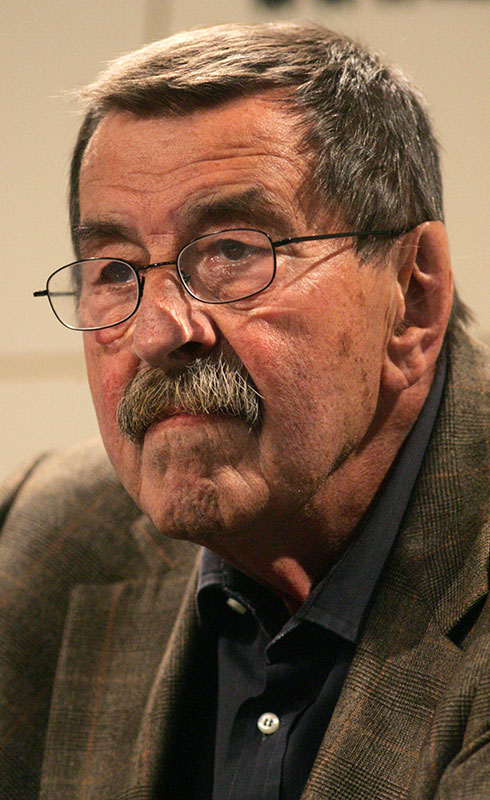
German novelist Günter Grass talk opened PEN’s 67th Congress
The freedom and the openings which many embraced after the break-up of the Soviet Union in the early 1990’s were beginning to close down and restrictions tighten. At the Moscow Congress Pasko expressed his gratitude for everything PEN had done to obtain his freedom. He urged the Assembly to focus on environmental problems. But he warned that the structure of the current Russian government had grown out of the KGB, and he feared nothing good would come for free speech or the environment.
In the opening address of the Congress German novelist Günter Grass, who won the Nobel Prize for Literature the previous year, recounted the many times in the past century that writers had called attention to the abuses and genocides which governments had tried to hide. “At least literature does achieve this—it does not turn a blind eye; it does not forget; it does break the silence,” Grass concluded.
The Congress theme “Freedom of Criticism. Criticism of Freedom…”seemed a particularly UNESCO title, with a focus on how freedom is exercised, noting that freedom unrestrained by morality can lead to a license for corruption, brigandage, state terrorism, censorship and the wanton murder of those who dare to speak out. “That freedom is a double-edged sword is a fact long appreciated in free societies. It is what prompted Voltaire to place a limitation upon it, when it interfered with the freedom of another,” one Congress description noted.
Thus framed, the panels and the work of PEN’s committees proceeded. Many wondered how able PEN members would be to criticize openly as we met both formally and in cafes sharing conversation and meals of blinis and caviar. There was no incident nor interference that I recall at the Moscow Congress nor at the subsequent programs in St. Petersburg, but we were all aware that repercussions could follow after we left. Over time Putin’s government did close down the space for NGO’s with Russian PEN as one of the early targets. (Future blog post.)
The Moscow Congress itself proved an opportunity to celebrate Russian literature and other literature as well as to conduct the work of PEN’s committees which met in halls named after Tolstoy, Pushkin, and Chekov. Many writers from over 70 PEN centers were visiting Moscow for the first time since the Soviet Union broke apart. Since my first trip in 1991 shortly after the coup attempt (PEN Journey 8), the city had changed. Western hotels, restaurants and stores had moved in; certain citizens had amassed wealth; others had lost jobs and security. It was a city of contrasts with children on the street begging, but begging by playing violins. A wealthy new group crowded the lobbies of western hotels and department stores.
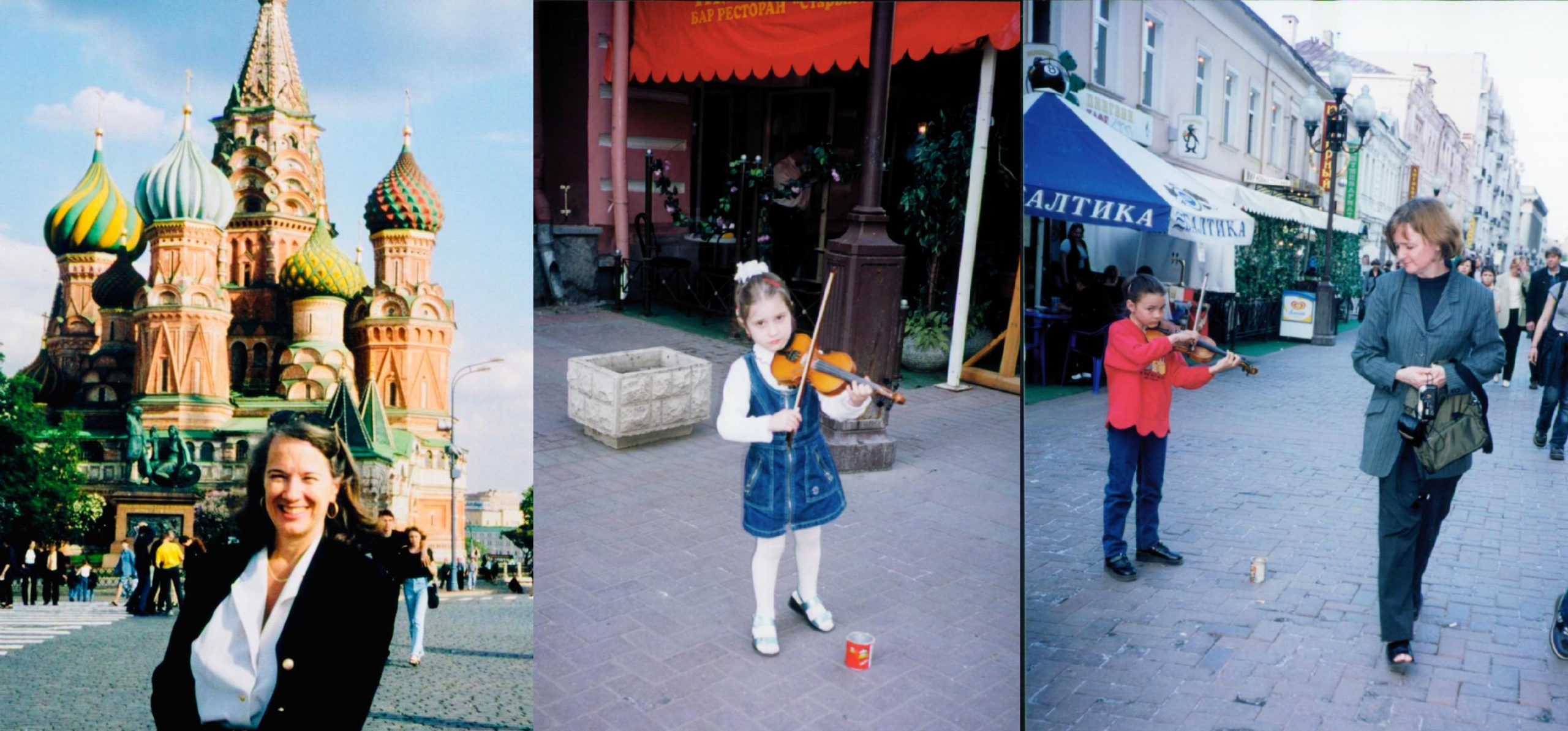
On the streets at PEN Congress in Moscow May, 2000: L: Joanne Leedom-Ackerman, PEN Vice President; R: Sara Whyatt, PEN Writers in Prison Committee Program Director
In a message to the Congress Andrei Bitov wrote:
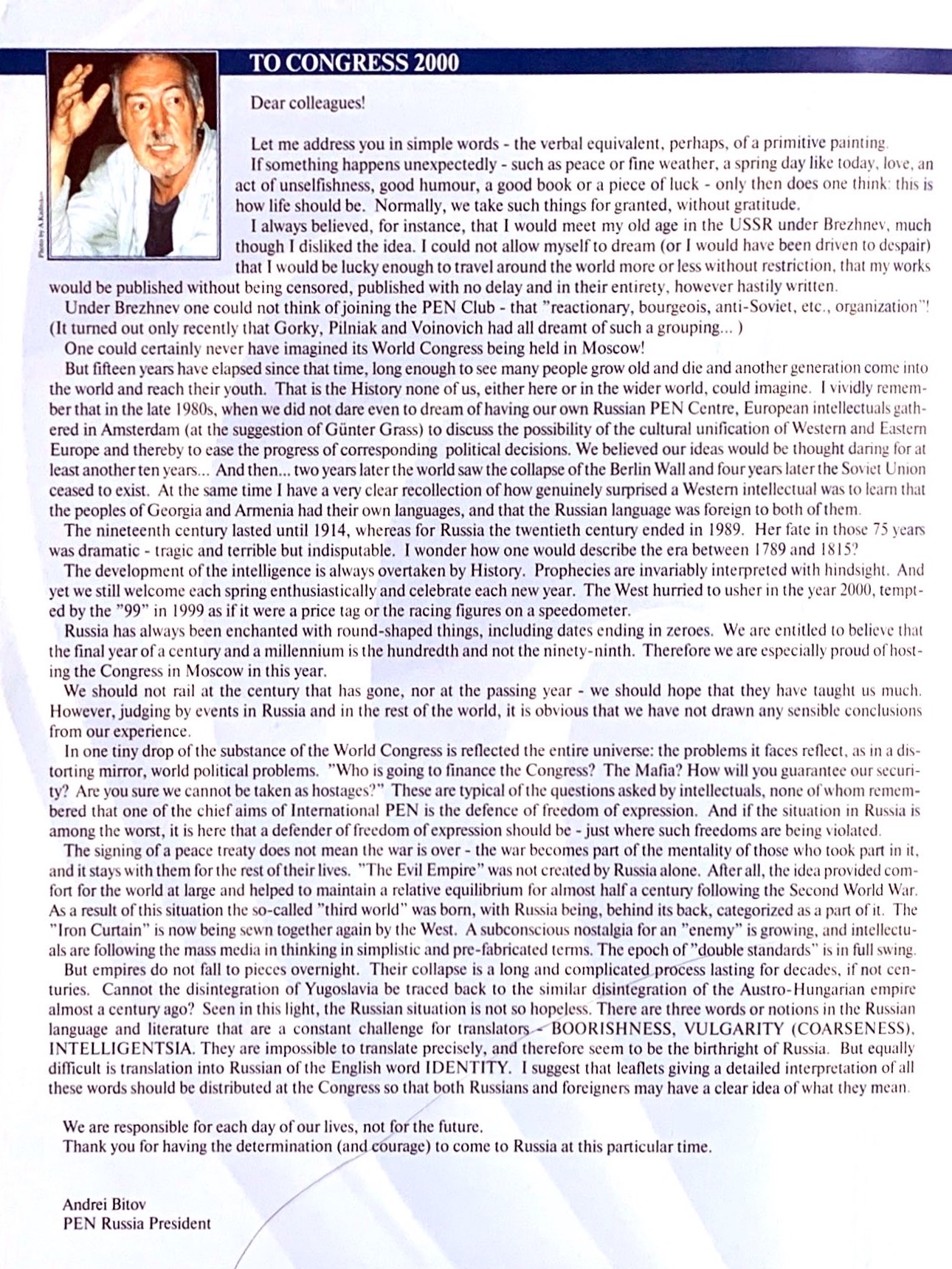
Full text of Russian PEN President Andrei Bitov’s message to PEN delegates
I always believed…that I would meet my old age in the USSR under Brezhnev, much though I disliked the idea. I could not allow myself to dream (or I would have been driven to despair) that I would be lucky enough to travel around the world more or less without restriction, that my works would be published without being censored, published with no delay and in their entirety, however hastily written.
Under Brezhnev one could not think of joining the PEN Club—that “reactionary bourgeois, anti-Soviet, etc., organization”! (It turned out only recently that Gorky, Pilniak and Voinovich had all dreamt of such a grouping…)
One could certainly never have imagined its World Congress being held in Moscow!
But fifteen years have elapsed since that time, long enough to see many people grow old and die and another generation come into the world and reach their youth. That is the History none of us, either here or in the wider world, could imagine…
We should not rail at the century that has gone, nor at the passing year—we should hope that they have taught us much. However, judging by events in Russia and in the rest of the world, it is obvious that we have not drawn any sensible conclusions from our experience…
In one tiny drop of the substance of the World Congress is reflected the entire universe, the problems it faces reflect, as in a distorting mirror, world political problems…
We are responsible for each day of our lives, not for the future.
Thank you for having the determination (and courage) to come to Russia at this particular time.
PEN’s business at the Assembly of Delegates included the International Secretary Terry Carlbom’s report on PEN’s relationship with UNESCO as the only global organization representing literature associated with UNESCO and a preliminary notice about a multi-year strategic plan under development. Business also included the election of the International President. Homero Aridjis was standing for a second term, and former International Secretary Alexander Blokh of Russian origin had returned to this PEN Congress for the first time since he’d stepped down as International Secretary in 1998, (PEN Journey 20) and he was also running for President. I was asked to chair the Assembly for the election, including during a stir that arose when Alex wasn’t present to speak for his candidature. He’d left the meeting early for an appointment, mistakenly thinking he would speak in the afternoon. However, there was no afternoon session, and controversy arose over whether the election should be postponed so he could speak. I ruled that he would be the first item on the morning agenda and then the election would proceed as scheduled. Homero Aridjis won a second term; Alexander Blokh continued to serve PEN for many years as a Vice President and President of French PEN.
Also at the Congress Martha Cerda (Guadalajara Center) succeeded Lucina Kathmann as Chair of the Women Writers’ Committee; Veno Taufer (Slovene PEN) succeeded Boris Novak, who’d opposed holding the Congress in Moscow and had stepped down as chair of the Writers for Peace Committee, and Eugene Schoulgin (Swedish PEN) was confirmed as the new Writers in Prison Committee Chair.
In his farewell comments as WiPC chair Moris Farhi quoted Günter Grass’s address that literature always breaks the silence. Moris added that by breaking the silence, by telling the truth and exposing wrong-doing, literature also defied fear and embraced courage. The members of International PEN had witnessed this defiance of fear and the manifestation of courage time and again. Moris noted among those with courage were Grigory Pasko, Alexander Tkachenko and our colleague Boris Novak.
The Moscow Congress saw the return of delegates from Chinese PEN after a decade-long absence post Tiananmen Square. Two resolutions on China were presented, one calling for the release of dissident writers imprisoned in China and another protesting the long prison terms for writers in Tibet. The Chinese delegate objected to both resolutions, arguing first that Tibet shouldn’t be singled out as though it were not part of China. He also said that the Chinese people and Chinese writers cared for human rights after centuries of feudal society, but the West emphasized individual rights and values while the Chinese valued collective human rights and obligations to the family and society. The Chinese believed that human rights in a given country were related to the social system, the level of economic development and historical and cultural traditions of that country, and they encompassed the right to development and subsistence. A country of more than 1.2 billion people had to find food and clothing. It was impossible for one pattern to solve all existing problems. The Cold War had ended, but its influence remained with those who believed their values, their concept of human rights, their position were the only correct ones in the world. Dialogue was the only way to resolve the differences of view, a dialogue based on equality and mutual respect.
Hands shot up seeking to respond. At least 25 delegates at the Assembly spoke, welcoming the return of the Chinese delegates to the PEN Congress, but most taking exception to the argument of the relativity of human rights in PEN’s work. The first to speak was Eric Lax of PEN Center USA West who said he appreciated the speaker’s comments but wanted to add that the PEN Charter, to which all members subscribed, was very clear that freedom to write was a basic tenant of the organization and that information should pass unimpeded without restriction. Some questioned the way the resolution was written. Alexander Tkachenko of Russian PEN said he felt PEN should be understanding of people living under a regime about which the rest of PEN knew little. It was up to the Assembly to decide whether to support the resolution; they needn’t accept the Chinese delegate’s opinion, but they should respect it. He didn’t want the Chinese to be missing from PEN for another ten years. PEN should be tolerant of those for whom it was extremely dangerous to discuss such questions. The Assembly applauded. A small amendment was made to the resolutions, both of which passed with large majorities, though not unanimously.
The following year the Independent Chinese PEN Center (ICPC) came into being, a center of independent writers and democracy activists inside and outside of China. One of the founding members and the second president of ICPC (2003-2007) was writer Liu Xiaobo, on whose behalf PEN worked twice when he was imprisoned after Tiananmen Square and again when he was arrested in 2009. Liu Xiaobo was the first Chinese citizen to win the Nobel Prize for Peace in 2010, but he was incarcerated in a Chinese jail, and he died in custody in 2017.
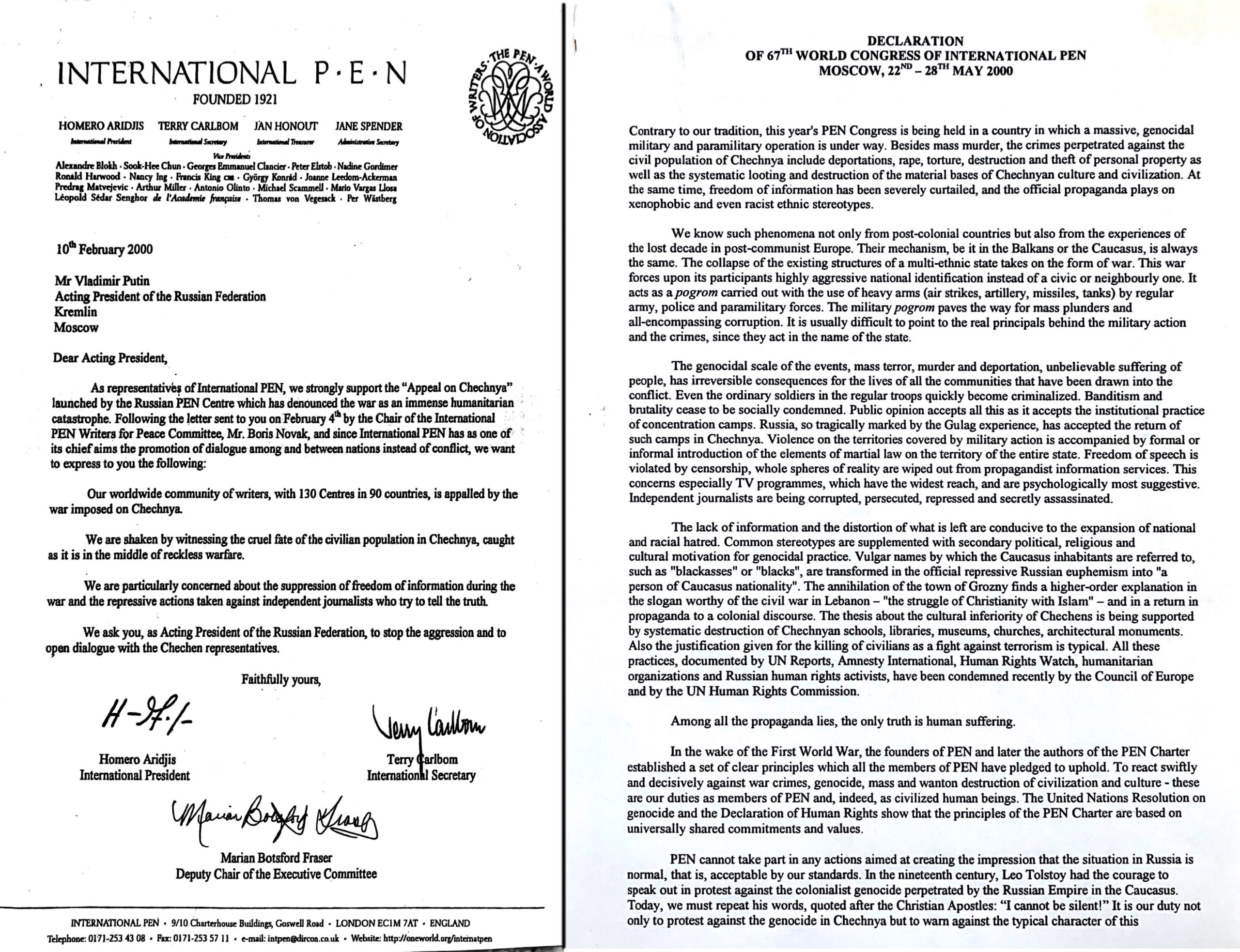
Next Installment: PEN Journey 25: War and more War: Retreat to London
PEN Journey 21: Helsinki—PEN Reshapes Itself
PEN International celebrates its Centenary in 2021. I’ve been active in PEN for more than 30 years in various positions and now as an International Vice President Emeritus. With memories stirring and file drawers of documents and correspondence bulging, I am a bit of a walking archive and have been asked by PEN International to write down memories. I hope this personal PEN journey will be of interest.
In the old days, at least my old days, the Vice Presidents of PEN International sat in a phalanx on a stage while the Assembly of Delegates conducted business—revered writers, mostly white older men, along with the President, International Secretary and Treasurer of PEN in the center. If the Assembly business wore on, it was not unusual to see one or two of them nodding off. The role of the Vice Presidents was to provide continuity—many had been former PEN Presidents—to provide wisdom, contacts and gravitas. The designation was for life.
But times were changing. For instance, I had recently been elected a Vice President. I was a woman. I’d served PEN in several positions, including president of my center, founding board member of the International PEN Foundation and International Writers in Prison chair; I was a writer, though not of international renown, and at the time I was relatively young. I had been nominated by English PEN whose General Secretary thought it was high time more women sat on that stage. I didn’t relish sitting on a stage, but I was honored to hold the position. The Helsinki Congress in 1998 was the first when Vice President was the only role I had. I don’t recall if there was a stage at that Assembly. The fun was that I didn’t have to do anything. I could float between committee meetings, offer comments when relevant, wisdom if I had any and be called upon for whatever insight or experience or task might serve. (Traditionally the Congress organizers paid for the Vice Presidents’ registration and hotel, but from the start I chose to cover my expenses as a way of contributing to PEN. The expense of Vice Presidents attending was growing more and more difficult for the host centers; on the other hand many Vice Presidents wouldn’t be able to attend otherwise.)
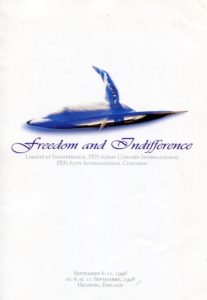
Program for 65th PEN International Congress in Helsinki, Finland
At the 65th PEN Helsinki Congress held at the Marina Conference Center on the waterfront, a short walk from the city center, delegates and PEN members from 70 centers around the world gathered. The Congress’ theme was Freedom and Indifference. My memories are of meals on the water with colleagues, of eating fish and mussels and walking among old and very new buildings, visiting the architecturally stunning Contemporary Art Museum and other cultural excursions I often didn’t have time to attend when chairing the Writers in Prison Committee.
At the Congress I could even sit in on a few of the literary sessions which included abstract topics such as Where Does Indifference End and Tolerance Begin?—The Role of the Intellectual in Contemporary Society; Eurocentrism and the Global Village; The Cultural Gap Between East and West; The Ambivalence of Otherness: Identity and Difference; Crime Literature Portraying the Society; On Cultural Creolisation (mixture) and Borderlands. I confess reading those topics now stirs memories of sleepy academic afternoons, but the writers presenting included some of the engaged and engaging writers of the day, including Wole Soyinka, Caryl Phillips, Andrei Bitov and many Finnish and Scandinavian writers such as Sweden’s Agneta Pleijel.
At the Congress I still concentrated on the work of the Writers in Prison Committee which former Iranian prisoner Faraj Sarkohi attended. The year before he had been a main case for PEN, imprisoned and tortured and threatened with execution. In introducing his presence to the Assembly of Delegates, PEN President Homero Aridjis noted that PEN members could take satisfaction in having played an important role in obtaining his release. Sarkohi had managed to get a passport and was now living in Europe where he’d resumed his literary and journalistic activities.
Moris Farhi, the new WiPC Chair, introduced Sarkohi to the General Assembly of Delegates where Sarkohi said he owed his life and freedom to the international movement initiated by PEN both in the London headquarters and in the PEN centers around the world. For the first time in 20 years the Iranian government had been forced to release someone they had wanted to kill, he said. His release demonstrated to other writers in Iran that release was possible even if the government wanted to execute them. Sarkohi had briefly spoken with another PEN main case in prison who told him he was no longer worried, knowing now about the international support he was receiving.
Sarkohi explained that writers were considered by the despots in Tehran to be guilty because they worked with words, because they tried to discover and express in words different aspects of truth. It was believed writers made magic, he said. Everyone knew the magical power inherent in words so the writers were arrested. The government forced them to deny themselves, to accept false charges, and in this way they killed writers mentally. When a writer was forced by physical and mental torture to deny himself, his ideas and his work, his power of creation died, and he was killed as a writer. When Sarkohi was in solitary confinement, he remembered the way in which those suspected of magic were treated in the Middle Ages. People were arrested and burned and told “If you live, your magic powers are proved and we kill you. If you die, it is established that you do not have magic powers.’—but you were dead anyway. Writers were regarded as the new practitioners of magic in this century and that treatment by tyrants and despots was that of the Middle Ages.
Sarkohi described how he and colleagues who were still in prison had issued a new Charter, inspired by the PEN Charter, in which they protested censorship, both by the government, self-censorship and by the public such as groups which beat up a writer in the street. The Charter also demanded the right for writers to organize an association, something not permitted in Iran. He worried now about the fate of his colleagues in Iran because five years ago when writers published a Charter and sent the text abroad, the government had reacted and killed a famous translator and dumped his body in the street and murdered a famous poet in his home.
Sarkohi noted that German PEN and other PEN centers had prepared a resolution for the Congress making it clear to the Iranian government that International PEN was watching the fate of Iranian writers so they would know before they arrested or killed someone that Iranian writers were supported. He believed that support let all the world see that writers were not alone.
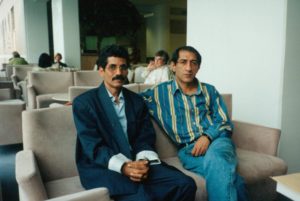
L to R: Mansur Rajih from Yemen, one of the first ICORN guests in subsequent years, and Iranian writer Faraj Sarkohi, former WiPC main case at PEN International’s 65th Congress in Helsinki, Finland, 1998
While the Helsinki Congress focused on the traditional work of PEN and its Committees, it was also a watershed Congress addressing the structure and governance of PEN. The Ad Hoc Committee, elected at the previous congress in Edinburgh (see PEN Journey 20), had examined the draft of revised Regulations and Rules and presented a final draft for the Assembly’s adoption. The revised Regulations and Rules were the product of two years’ work and consultations among centers. These were the first amendments to the Regulations of PEN since 1988 and the first major revision since 1979.
International PEN’s reform to provide more democratic decision-making, more communication between the International and the Centers and more transparency was not an entirely smooth transition and reflected a larger global trend at the time among the 100+ nationalities represented in PEN.
At the Congress a new International Secretary—Terry Carlbom from Swedish PEN—was elected as the only candidate, Peter Day, editor of PEN International magazine, having stepped down from consideration because of health reasons. The former International Secretary Alexandre Blokh, who had served for 16 years, didn’t attend the Congress, but was elected a Vice President and returned to subsequent Congresses.
Marian Botsford Fraser of PEN Canada, representing the Ad Hoc Committee, presented the new proposed Rules and Regulations, noting that they were “the nuts and bolts or the strings and hammers of a piano or the engine of a car or mother board of a computer. In any case their workings were unfamiliar to most writers,” she said. “It was as if we had been asked to rebuild the engine of a 1979 Audi, a vehicle renowned for the complexity of its construction. Frankly I can think of only one more difficult assignment for nine writers and that would have been to collaborate on the writing of a novel.”
She noted that the Committee of nine was a diverse collection of individuals with the wisdom that democracy sometimes magically bestowed upon its practitioners. The Edinburgh Assembly had chosen a group of people who represented the linguistic, cultural and geographic diversity of PEN and who brought to the table individually and collectively their commitment to the history and the future of PEN, their desire to remain true to the spirit of the Charter of PEN and to the identity of PEN as first and foremost an organization of writers working together to protect language, literature and the fundamental human right of freedom of expression. “We brought to the process different and strongly held views on how to make the regulations that we were charged with drafting embody those principles, how to create a structure that would become the foundation for the future of this organization,” she said.
She thanked certain Ad Hoc members, who in fact did seem to have some knowledge of the workings of a 1979 Audi and added special thanks to Administrative Director Jane Spender “who took the whole mess of scribbled bits of paper, half sentences, cryptic clauses, clearly articulated ideas and sometimes incoherent good intentions back to London, and through another process of consultation and discussion and writing and rewriting was able to turn all of this into two documents that were sent to all Centers as Draft Regulations and Rules.” Homero Aridjis, the new International PEN President, also participated in this task along with the Ad Hoc Committee.
As I read through the minutes of the Helsinki Assembly, I recalled the tensions that arose, particularly around single words such as “a-political”—after all we were an organization of writers where words and translation of words mattered—and around events that had happened off stage. Changing the way a 77-year old organization worked was perhaps more like shifting from an Audi into an SUV which could hold more people, handle more difficult terrain but also consumed more fuel and energy. But metaphors aside, after debate and discussion, agreement was ultimately achieved.
The most important change was the move to form an Executive Committee that would be the main implementing body for International PEN, a step agreed by most all Centers who chose to participate in the process. Instead of government by a small executive of the President, International Secretary and Treasurer between the Assembly of Delegates’ meetings, an Executive Committee of seven members drawn from the centers around the globe and elected for three-year terms (and up to six years) would operate along with the three executives of PEN. The election for the first Executive Committee was to take place at the 1999 Congress in Warsaw. Until then the Ad Hoc Committee would continue to function and also act as a Selection Committee to assure qualified candidates were put forward.
Details of this new structure were modified over the next twenty years. The Selection Committee evolved into an elected Search Committee to assure qualified candidates were proposed for the various offices and to gather their required papers. The Search Committee was not set up to be a guardian council or an arbiter of candidates, but a facilitator for the process. In 2005 an Executive Director was added to the equation. As with any organization, PEN keeps growing and changing, but the essential structure to broaden and democratize governance of this global organization was set in place in 1998 in Helsinki. I’m not sure what vehicle I would compare PEN to these days, probably not a finely tuned Audi, but it continues to drive.
As for Vice Presidents, that office was not changed during this watershed period of reform, but over time, PEN changed the role of Vice Presidents and designated the ex-Presidents as Presidents Emeritus instead and divided the Vice Presidents into two equal categories with twelve in each: those elected for “service to PEN” and those designated for “service to literature;” the later included internationally renowned writers and Nobel laureates such as Nadine Gordimer, Toni Morrison, Svetlana Alexievich, Orhan Pamuk, Margaret Atwood, Ngũgĩ wa Thiong’o, J.M. Coetzee.
When I became International Secretary (2004-2007), the Executive Committee (now called the Board) and I proposed, and the Assembly agreed, that Vice Presidents’ terms should be limited, at least in the category of service to PEN—ten years or sometimes twenty—then most would move to emeritus status. It took another ten years before this change was implemented.
These are arcane details but illustrate PEN as an organization striving to keep those experienced engaged at the same time keep the organization unencumbered so it can grow and bring in new ideas and talent. It is a vehicle constantly re-tooling with the Charter as its base and a body of creative members whose greatest talents are not necessarily in rules and regulations yet who respect their necessity. Vice Presidents Emeritus, as I now am, are invited to the Congresses and show up and are still sought out for the bit of history we know and for the bits of wisdom we might offer from our experience and for continuity. We knew PEN in the days of the Audi, though even then it was perhaps not so finely tuned, I think, but it got from here to there across the globe as it still does.
Next Installment: PEN Journey 22: Warsaw—Farewell to the 20th Century
